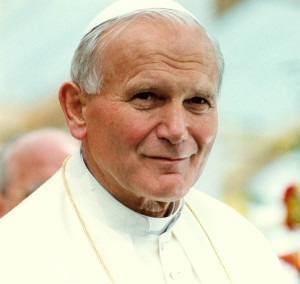The social teaching of St. John Paul II
 The other day I looked at the contributions of St. John XXIII to Catholic social teaching. Today we turn to St. John Paul II.
The other day I looked at the contributions of St. John XXIII to Catholic social teaching. Today we turn to St. John Paul II.
Over his 27 years as Bishop of Rome, Pope John Paul II published three major social encyclicals and two more that had major implications for Catholic social teaching.
Laborem Exercens, On Human Work (1981), offers a positive vision of work, asserting that the work that people do on a daily basis is a way of sharing in the creative work of God in the world. We become who we are largely through the work we do, the Pope said, putting him in close conversation with Karl Marx and making clear that by “work” he means not just paid employment (as Marx did), but other activities like taking care of one’s family and participation in community organizations.
The encyclical offered a ringing affirmation of the universal destination of goods, the principle of Catholic social teaching that says that the right to private property is not “absolute and untouchable” because the goods of the earth are meant for everyone. John Paul II insisted on the right to a “family wage” – wages that allow one breadwinner to support a family, as well as grants to mothers who do the important work of staying home to raise children.
Following LE’s publication, theologian Gregory Baum called the encyclical “a daring undertaking” that “raise[d] the Church’s social message to an unprecedented height.” Others, though, criticized its call for a family wage and family grants as a not so subtle means of keeping women at home and out of the workplace.
Sollicitudo Rei Socialis, On Social Concerns (1987) was primarily about human development, marking the twentieth anniversary of Populorum Progressio, Pope Paul VI’s landmark encyclical on the same topic. (The Pope’s choice to mark the anniversary of an earlier social encyclical other than Rerum Novarum – the landmark encyclical of Pope Leo XIII that marks the beginning of modern Catholic social teaching – was itself unusual. Pope Benedict would later repeat the move by marking a Popularum Progressio anniversary with his own encyclical, Caritas in Veritate.)
John Paul II was very critical in SRS of the growing gap between rich and poor nations, and also between rich and poor people within individual nations. He criticized the consumerism and “superdevelopment” common to western nations like the United States. The encyclical was also the first to address the issue of ecology is a serious way.
John Paul drew attention to structures of sin, our society’s institutions, laws, and cultural attitudes that reinforce sin and injustice. He also emphasized in a significant way the virtue of solidarity, the principle of Catholic social teaching that insists on our moral responsibility for one another and for the common good. In both of these ways, the encyclical shows the marks the integration of fundamental aspects of liberation theology into the formal teaching of the Church.
Centessimus Annus, On the Hundredth Anniversary of Rerum Novarum (1991), marked the centennial of the publication of Rerum Novarum. The anniversary happened to fall soon after the historic collapse of the Communist empire in the revolutions of 1989 and 1990. Though it was perhaps unsurprising that this development was very much on the Pope’s mind, given his Polish roots and his own role in bringing it about, many criticized CA for the decidedly Eurocentric vision that resulted from the text’s preoccupation with the events.
In his encyclical, John Paul II assessed free markets and capitalism in these new global circumstances. He acknowledged the positive aspects of the free market, such as freedom and prosperity, as well as its negative aspects, including exploitation of workers and structures that oppress the poor. The pope again insisted upon the relative nature of the right to private property, teaching that to keep the goods of the earth from those in dire need is the same as stealing from them. The morality of markets, he said, must be assessed in light of such principles, and these markets must be limited by laws that protect the dignity of all.
In addition to these three encyclicals, two other major documents from John Paul II also made significant contributions to the church’s social teaching, though neither is typically included in standard lists of “social encyclicals.” In his apostolic exhortation Familiaris Consortio, On the Role of the Christian Family in the Modern World (1981), Pope John Paul spoke of families as “domestic churches” and insisted that work on behalf of social justice and the common good were central aspects of the mission of the Christian family in society.
In his encyclical Evangelium Vitae, On the Value and Inviolability of Human Life (1995), John Paul clearly made the church’s opposition to abortion part of its social teaching. Invoking this venerable tradition, he wrote, “Just as a century ago it was the working classes which were oppressed in their fundamental rights, and the Church very courageously came to their defense by proclaiming the sacrosanct rights of the worker as a person, so now, when another category of persons is being oppressed in the fundamental right to life, the Church feels in duty bound to speak out with the same courage on behalf of those who have no voice. Hers is always the evangelical cry in defense of the world’s poor, those who are threatened and despised and whose human rights are violated.”
The contributions to Catholic social teaching by the church’s two newest saints – Pope John XXIII and Pope John Paul II – are major aspects of the legacy they leave and the challenge they offer us today.





